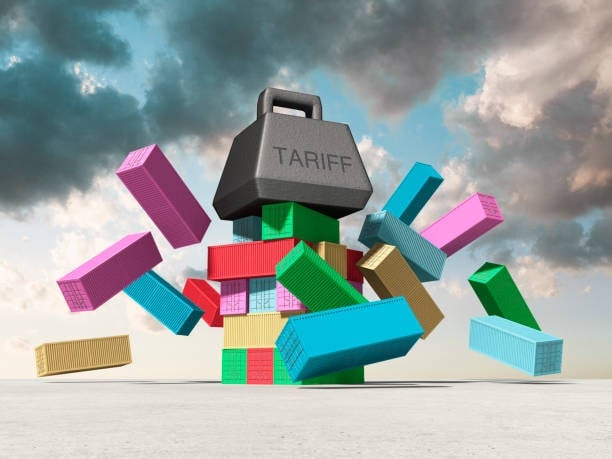CEOs to Trump: It's time to make a trade war deal
The mood in the C-suite is growing sour as more CEOs get more vocal about the need for tariff relief

The bloom is very much off the rose when it comes to the business community’s embrace of President Donald Trump’s second term. With his imposition of steep tariffs on virtually every country around the globe threatening to tip the United States into a recession, CEOs are pleading with the president to start making those deals he likes to boast about.
The mood in C-suites around the country was summed up by Goldman Sachs (GS) CEO David Solomon, who said in a recent Bloomberg interview that “the policy actions to date have raised the level of uncertainty to a degree I do not think is healthy for investment and growth.” He’s not alone. “As I am talking to CEOs, talking to our clients, they are holding back on investment, and they are certainly tightening their belts,” he said.
That’s a 180-degree turn from the attitude of corporate executives when Trump took office in January. Back then, business leaders at the World Economic Forum in Davos were brimming with optimism, hopeful that the Trump administration would usher in lower taxes, less regulation, and a favorable business environment.
But Trump’s “Liberation Day” on April 2, when he announced the steepest tariffs the country has seen in over a century, left executives reeling. Last month, the CEOs of Walmart (WMT) and Target (TGT) privately warned Trump in an Oval office meeting that his tariff policy could disrupt supply chains and lead to empty shelves in the coming weeks, CBS News reported.
Virgin Group CEO Richard Branson was one of the first business leaders to plead publicly with Trump to back away from his tariff policy. In an April 7 post on X, he said the Trump administration needed to “own up to a colossal mistake and change course” before the economic fallout spreads. “As the dollar is weakening, US consumer prices will rise. And countless small and medium-size enterprises will go, and already are going, bankrupt as a result,” Branson said.
Since then, the CEOs of American Airlines (AAL), PepsiCo (PEP), Procter & Gamble (PG) and many other major U.S. companies have publicly warned that uncertainty over tariffs makes it difficult to formulate business plans and is dampening consumer sentiment.
Last week, Chamber of Commerce CEO Suzanne Clark wrote a letter to Commerce Secretary Howard Lutnick, Treasury Secretary Scott Bessent, and Trade Representative Jamieson Greer, warning them of economic trouble as the administration tries to cobble together new trade agreements.
“We are deeply concerned that even if it only takes weeks or months to reach agreements, many small businesses will suffer irreparable harm,” she wrote.
Clark might be hoping that Trump will react to her missive the way he did to a similar letter sent to the president sent in April by auto industry groups representing General Motors (GM), Volkswagen (VWAGY) and Toyota (TM). That letter pleaded with him to reconsider a 25% tariff on car parts that was to go into effect May 3. On April 29, he temporarily relieved the auto industry from “permanent” tariffs.
That didn’t quite reassure GM CEO Mary Barra. In a letter to shareholders released last week, she warned that tariffs could still cost the company as much as $5 billion this year. She walked a narrow path in the letter, praising the Trump administration while highlighting the challenges GM faces from tariffs.
UPS (UPS) has also been vocal about the uncertainty facing its business — especially since shipping goods from China to the U.S. represents 11% of the company’s international revenue. In a recent call with investors, UPS CEO Carol Tomé said Trump’s trade policies were particularly debilitating for small and midsize businesses that buy goods from China.
Tomé said smaller companies, which didn’t have the financial wherewithal to stock up before the tariffs took effect, are now saying, “Wow, how are we going to handle this cost increase that’s coming our way?”
The results of a recent CEO survey indicate that there may be more of this kind of talk. The poll of 329 U.S. business leaders, by Chief Executive magazine, found that 67% did not agree with the president’s tariff agenda, and 76% believe the import taxes will hurt their companies.
CEO confidence is at its lowest level since November 2012.